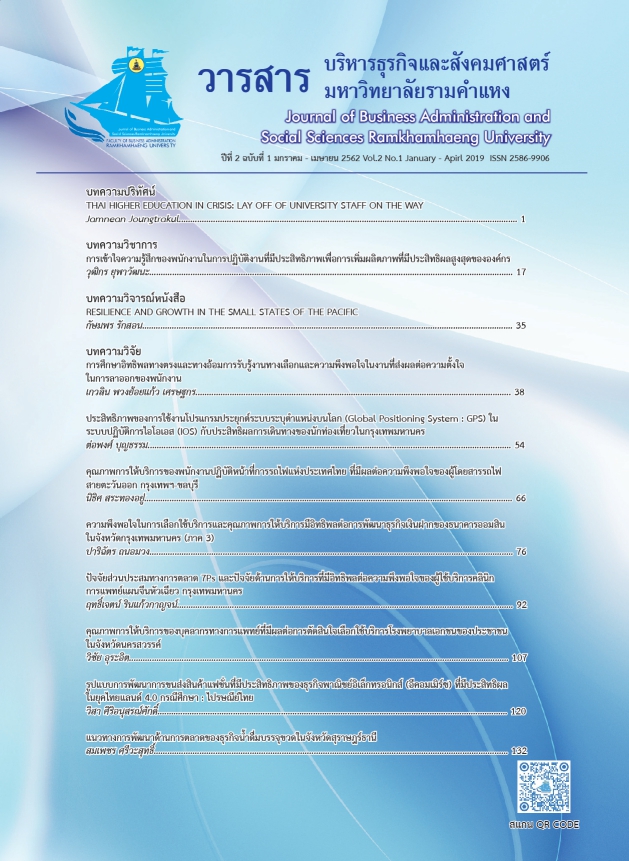THAI HIGHER EDUCATION IN CRISIS: LAY OFF OF UNIVERSITY STAFF ON THE WAY
Main Article Content
Abstract
The desire of the Thai people to continue studying at university level is in a decreasing trend. The major reasons comprise the reduced birth rates of the Thai people, the changing values in the need of a university degree and the economic situation of the country. Many programs have been closed down due to a lack of students, leading to restructuring and downsizing. Privatization may occur in certain cases. Mergers and acquisitions are seen in many universities and some of them may be faced with closing down. This paper aims to identify the following issues: (1) challenges faced by Thai universities; (2) possible negative consequences from the challenges affecting Thai universities; (3) possible effects of the consequences on human resource management of Thai universities; (4) processes for managing redundancy in Thai universities; and (5) processes for handling lay off in Thai universities.
Article Details
เนื้อหาและข้อมูลในบทความที่ลงตีพิมพ์ในวารสารบริหารธุรกิจและสังคมศาสตร์ มหาวิทยาลัยรามคำแหง ถือเป็นข้อคิดเห็นและความรับผิดชอบของผู้เขียนบทความโดยตรง ซึ่งกองบรรณาธิการไม่จำเป็นต้องเห็นด้วย หรือร่วมรับผิดชอบใดๆ
บทความ ข้อมูล เนื้อหา รูปภาพ ฯลฯ ที่ได้รับการตีพิมพ์ในวารสารบริหารธุรกิจและสังคมศาสตร์ มหาวิทยาลัยรามคำแหง ถือเป็นลิขสิทธิ์ของวารสารบริหารธุรกิจและสังคมศาสตร์ มหาวิทยาลัยรามคำแหง หากบุคคลหรือหน่วยงานใดต้องการนำบทความทั้งหมดหรือส่วนหนึ่งส่วนใดไปเผยแพร่ต่อ หรือเพื่อกระทำการใดๆ จะต้องได้รับอนุญาตเป็นลายลักษณ์อักษรจากวารสารบริหารธุรกิจและสังคมศาสตร์ มหาวิทยาลัยรามคำแหง ก่อนเท่านั้น
References
Akdogan, A., & Cingoz, A. (2009). The Effects of Organizational Downsizing and Layoffs on Organizational Commitment : A Field Research. The Journal of American Academy of Business, Cambridge, 14(2), 337-343.
AlbertaGovernment. (2012). Thinking About Layoffs? What you need to know before letting people go. Alberta, Canada: Government of Alberta, Human Services.
Arora, M., & Kumar, A. (2012). A Study on Merger and Acquisition - Its Impact on Management and Employees. Research Journal of Economics & Business Studies, 1(5), 30-34.
Bohlander, G., & Snell, S. (2004). Managing Human Resources. Ohio: South-Western.
BOI. (2017). Thailand 4.0 Means Opportunity Thailand. Thailand Investment Review, 27(2),1-12.
Broucker, B., & DeWit, K. (2013). Liberalisation and Privatization of Higher Education in Flanders: passing the point of no return? A Case Study. European Educational Research Journal, 12(4), 513-524.
Davis, J. A. , Savage, G., & Stewart, R. T. (2003). Organizational Downsizing: A Review of Literature for Planning and Research. Journal of Health Care Management, 48(3), 181-199.
Estelami, H. (2017). The Pedagogical And Institutional Impact Of Disruptive Innovations in Distance Business Education. American Journal of Business Education, 10(3), 97-107.
Flanagan, D. J., & O'Shaughmessy, K. C. (2005). The Effect of Layoff on Firm Reputation. Journal of Management, 31(3), 445-463.
Haque, M. N., Soonthorndhada, K., Hunchangsith, P., & Kanchanachitra, M. (2016). Active Ageing Level in Thailand: A Comparison Between Female and Male Elderly. J Health Res, 30(2), 99-107.
Heracleous, L. (2001). What is the Impact of Corporate Governance on Organizational Performance? Corporate Governance, 9(3), 165-173.
Hilmi, M. F. (2016). Disruptive Innovation in Educaion: Open Learning, Online Learning, MOOCs and What Next? Internaional Journal of Humanities and Social Science Invention, 5(10), 49-53.
Hoffman, R. C., & Shipper, F. M. (2011). The impact of managerial skills on employee outcomes: a cross cultural study. The International Journal: of Human Resource Management, 1-22.
Jitsuchon, S. (2012). Thailand in a Middle-income Trap. TDRI Quarterly Review, 27(2), 13-21.
Joungtrakul, J. (2009). Industrial Democracy and Best Practice in Thailand. Saarbrucken, Germany: LAP Lambert Academic Publishing AG & Co. KG.
Joungtrakul, J. (2016). Making Change Last: Is It an Impossible Task in Thailand. AFBE Journal, 9(1), 34-52.
Joungtrakul, J. (2018a). The Major Challenges Effecting Human Resource Management in Public Universities in Thailand (in Thai). Prae-wa Kalasin Journal of Kalasin University, 5(2), 215-238.
Joungtrakul, J. (2018b). A Time to Lay Off: Thai Universities on Fire! Paper presented at the HR4ASIA Conference, Thammasat University, Bangkok, Thailand.
Maesincee, S. (2018). Govt Plans a New Ministry: The Research and Education Ministry Startup Thailand Market Trend. Online: https://www.startupthailand.org/en/govt-plans-a-new-ministry-the-research-and-education-ministry/: Retrieved 8 Oct 2018.
Marccus, J. (2017). University enrollment decline continues into sixth straight year. Online: https://hechingerreport.org/university-enrollment-decline-continues-into-sixth-straight-year/: Retrieved 8 Oct 2018.
Mondy, R. W. (2010). Human Resource Management (11 ed.). Boston: Pearson Education, Inc.
NESDB. (2018). National Strategy 2018-2037 (in Thai). Bangkok: National Strategy Secretariat Ofice, Office of the National Economic and Social Development Board.
Noe, R. A., Hollenbeck, J. R., Gerhart, B., & Wright, P. M. (2011). Fundamentals of Human Resource Management (4 ed.). New York: McGraw-Hill/Irwin.
Nyasha, M. (2016). Imact of Redudancy on Organizational Performance. Internaional Journal of Innovative Research and Development, 5(6), 530-536.
Office of the Higher Education Commission. Higher Educational Statistics. Online: http://www.info.mua.go.th/information/: Retrieved 8 Oct 2018.
Pahirathan, A. (2017). A Literature Review on Outsourcing of Services in Universities. IORS Journal of Business and Management, 19(12), 47-56.
Phaitoonpong, S. (2014). Graduates Labor Market. Online: https://tdri.or.th/2015/08/matichon-2014-05-30/: Retrieced 8 October 2018.
Rose, E. (2001). Employment Relations. Harlow: Pearson Education.
Salamon, M. (2000). Industrial Relations: Theory and Practice (4 ed.). Edinburgh: Pearson Education.
Schneider, R. C. (2016). Understanding and Managing Organizational Politics. International Journal of Recent Advances in Organizational Behaviour and Decision Sciences, 2(1), 697-709.
Smith, B. (2017). Thailand to open up to foreign higher education institutions The Pie Review. Online: htpp://www.thepienews,com: Retrieved 8 October 2018.
Srithanaviboonchai, K., Moongtui, W., Panpanich, R., Suwanteerangkul, J., Chariyalertsak, S., Sangthong, R., & Aekplakorn, W. (2014). Characteristics and Determinants of Thailand's Declining Birth Rate in Women Age 35 to 59 Years Old: Data from the Fourth National Health Examination Survey. J Med Assoc Thai, 97(2), 225-231.
Sunderman, G. L., Coghlan, E., & Mintrop, R. (2017). School Closure as a Strategy to Remedy Low Performance. Online: http://nepc.colorado.edu/publication/closures: Retreived 11 Nov 2018.
Tehreem, A., Nawaz, Y., & Mahmood, B. (2013). Perception About Causes And Impact Of Poor Leadership (A Study In Sargodha City. IOSR Journal of Humanities and Social Science, 16(6), 58-62.
UUK. (2017). Patterns and Trends in UK Higher Education 2017. London: Universities UK (UUK).
Wales, J., Magee, A., & Nicolai, S. (2016). How does political context shape education reforms and their success? Dimension Paper 6. London: Overseas Development Institute.
Yukl, G. (2008). How leaders influence organizational effectiveness. The Leadership Quarterly, 19, 708-722.
